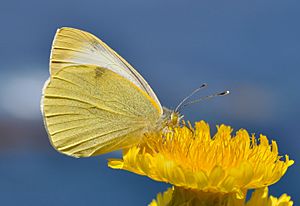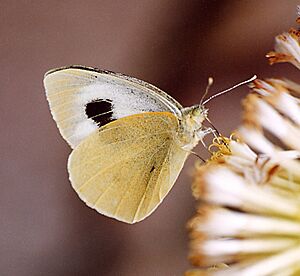Canary Islands large white facts for kids
Quick facts for kids Canary Islands large white |
|
|---|---|
 |
|
| Conservation status | |
| Scientific classification |
|
| Kingdom: | Animalia |
| Phylum: | Arthropoda |
| Class: | Insecta |
| Order: | Lepidoptera |
| Family: | Pieridae |
| Genus: | Pieris |
| Species: |
P. cheiranthi
|
| Binomial name | |
| Pieris cheiranthi (Hübner, 1808)
|
|
| Script error: The function "autoWithCaption" does not exist. | |
Script error: No such module "Check for conflicting parameters".
The Canary Islands large white (Pieris cheiranthi) is a type of butterfly that belongs to the Pieridae family. It is found only in the Canary Islands of Spain. This means it is endemic to these islands, so you won't find it naturally anywhere else in the world!
Contents
What Does the Canary Islands Large White Look Like?
This butterfly looks a lot like the well-known large white butterfly. However, the Canary Islands large white has much bigger black spots on its wings. These spots often join together. This butterfly can grow to be about 57 to 66 millimeters wide.
Where Does the Canary Islands Large White Live?
The Canary Islands large white butterfly is found on several islands. It is quite common on La Palma. On Tenerife, it lives mainly in the northern coastal areas. Sadly, the last time this butterfly was seen on La Gomera was in 1975. It is likely that it no longer lives there. There have also been some reports of it on Gran Canaria, but these have not been fully confirmed.
Types of Canary Islands Large White Butterflies
Scientists have identified two main types, or subspecies, of this butterfly:
- Pieris cheiranthi cheiranthi (Hübner, 1808)
- Pieris cheiranthi benchoavensis Pinker, 1969, found on La Palma in the Canary Islands.
What Kind of Places Does This Butterfly Like?
The Canary Islands large white butterfly prefers cool, wet, and shady areas. It often lives in deep valleys within laurel forests. These are special types of forests found in places with high humidity. You can also find it in other damp spots, like wet cliffs, even outside the main laurel forest areas.
Life Cycle of the Canary Islands Large White
The female butterfly lays her eggs on the underside of leaves. She places them in groups of 5 to 50 eggs. When the caterpillars hatch, they are light green with black dots. They also have a light yellow stripe along their top and sides.
What Do the Caterpillars Eat?
The caterpillars eat different plants. They enjoy Canary silverwort (Lobularia canariensis) and nasturtium (Tropaeolum majus). However, their main natural food plant is Crambe strigosa. This plant is also special because it only grows in the Canary Islands.
How Many Generations Are There?
These butterflies have many generations throughout the year. There can be seven to eight generations, one after another. These generations often overlap, meaning you can see butterflies at different stages of their life cycle at the same time. Adult butterflies can be seen all year long. They do not go into a resting period (called diapause) during colder months.
What Threats Does This Butterfly Face?
The Canary Islands large white butterfly is considered an endangered species. Its biggest threat is the loss of its natural home. As forests and natural areas are changed or destroyed, these butterflies lose the places they need to live and find food.
See also
 In Spanish: Mariposa capuchina común para niños
In Spanish: Mariposa capuchina común para niños
 | Stephanie Wilson |
 | Charles Bolden |
 | Ronald McNair |
 | Frederick D. Gregory |



